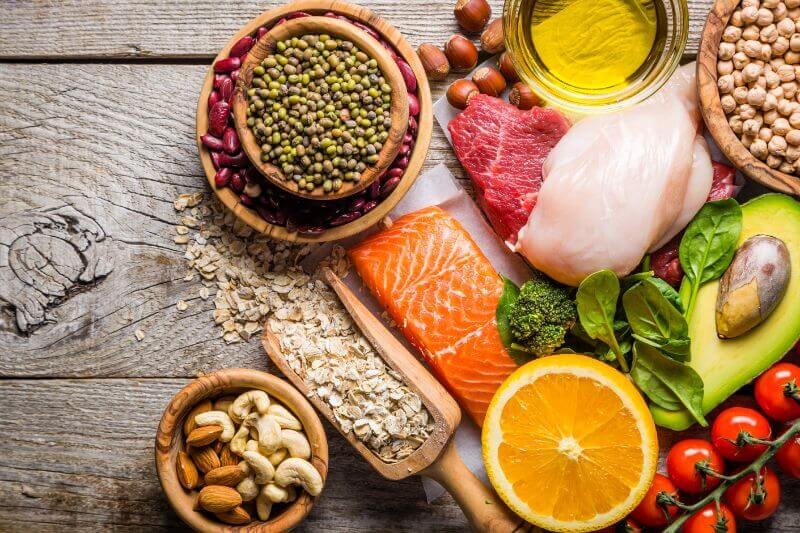
How What You Eat Affects Your Skin
We all want healthy skin.
Treatment options for acne vulgaris include topical creams and oral medications, but a simpler, holistic approach may involve adjusting your diet.
If you are what you eat, your skin may be a direct reflection of what’s going on inside your body. What we fill our plates with could significantly affect the health and appearance of our skin.
A comprehensive review published in Nutrients last month explores the link between certain foods and acne. The evidence suggests that specific dietary components can lead to acne, one of the most common skin complaints. The review found that dairy, fried foods, alcohol, gluten, eggs, corn, sweets, and soft drinks may all play a role in the development and exacerbation of the condition.
Understanding the connection between diet and skin health may help you make informed choices that contribute to a healthy, glowing complexion.
The Connection Between Diet and Skin Health
Skin health may be linked to gut health. A review published in Microorganisms in 2022 examined a large body of research on the topic and explored the connection between the gut microbiome and our skin, known as the gut-skin axis. Though a complex relationship, evidence supports the “bidirectionality” between the two, particularly with acne.
The exact mechanisms are unknown, but the review concluded that foods that aggravate intestinal permeability may be a factor in the development of acne. A separate review also published in 2022 found that “acne is a disease that can be related to the condition of the digestive tract and its microbiome.”
Increased intestinal permeability, colloquially referred to as “leaky gut,” is a condition in which the lining of the small intestine becomes damaged, leading to undigested food particles, toxins, and bacteria leaking into the bloodstream. This permeability may cause an autoimmune response and lead to various symptoms, including food sensitivities, fatigue, bloating and digestive issues, and joint pain.
Leaky gut can cause inflammation throughout the body, including the skin. Inflammation is often associated with various skin conditions, including acne, eczema, and psoriasis. Additionally, according to an article by naturopathic doctor Joseph Pizzorno, the influx of bacteria and toxins in the bloodstream can interfere with the body’s detoxification pathways, which may also contribute to skin issues.
What Causes Acne?
Acne vulgaris is a skin condition that occurs when hair follicles become clogged with oil and dead skin cells. The buildup can result in the formation of pimples, blackheads, or whiteheads. Acne vulgaris typically appears on the face, neck, chest, and back. Though it is caused by a variety of factors, including hormonal changes, genetics, age, and certain medications, diet is often overlooked. Treatment options for acne vulgaris may include topical creams and oral medications, but a much simpler and holistic option may be adjusting your pantry and fridge.
Foods That May Exacerbate Acne, Other Skin Issues
The connection between diet and skin health is an emerging field of research, and more studies are needed before any strong conclusions can be drawn. However, the recent review in Nutrients analyzed existing publications and identified several evidence-based key foods that contribute to acne:
Chocolate
Chocolate was found to be an instigator. The review noted that in a study of 25 acne-prone men, 99 percent dark chocolate worsened symptoms of acne. Given the small sample size of the study, more research is needed to draw conclusions about dark chocolate.
Additionally, ruling out the sugar and dairy additives found in most chocolate products as potential triggers is essential. Dr. Hannah Kopelman, a dermatologist based in New York, wrote in an email to The Epoch Times, “[It is] the sugar and dairy in many chocolate products that can exacerbate acne.”
Fats
Saturated fatty acids and trans fats found in common Standard American Diet food items, such as fast food, chips, and pizza, may be potential triggers of acne. A high intake of palmitic acid—a saturated fatty acid found primarily in palm oil, cottonseed oil, cocoa butter, and lard—can increase sebum production and the formation of blackheads.
Sugar
Sweet foods, particularly those with a high glycemic index, such as soft drinks can increase insulin levels. Elevated insulin levels may stimulate the production of oils in the skin and trigger the development of acne. A study published in BMC Dermatology in 2012 concluded that a diet with a high glycemic load contributed to acne.
According to Dr. Kopelman, “excessive sugar and ultra-processed foods can lead to chronic inflammation, glycation (where sugar molecules attach to proteins like collagen, making the skin less elastic), and hormonal imbalances, resulting in increased oil production and acne.”
A review published in 2023 in Biomedicine & Pharmacotherapy determined a link between acne and metabolic syndrome, a group of disorders that includes insulin resistance and obesity.
Milk and Dairy Products
Dairy is also a culprit of acne.
“Dairy products like milk and cheese, particularly those high in fat and processed, have been linked to skin issues such as acne because of the hormones they contain,” Dr. Kopelman said.
It is believed that the hormones and bioactive molecules present in dairy may influence skin inflammation and the production of oils, both of which can trigger acne.
“[Dairy] can interact with the body’s own hormones and potentially increase oil production and clog pores. Even lower-fat options like 1% or 2% milk can contribute to acne, with skim milk sometimes being more problematic due to higher hormone levels,” Dr. Kopelman said.
Other Dietary Connections to Skin Health
Consuming alcohol can increase testosterone levels and weaken the immune system, which can lead to inflammation and bacterial growth, potentially causing acne. Additionally, daily consumption of corn, a common allergen, may also contribute to acne. The study published in Nutrients also showed that those with acne tend to consume more salt and salty snacks.
Story continues below advertisement
Furthermore, gluten-free diets are often recommended for people with skin issues, as conditions such as psoriasis, atopic dermatitis, and vitiligo have been shown to improve with the elimination of gluten.
Lastly, there is evidence suggesting that eggs may exacerbate acne in some individuals. A 2022 study found a link between egg allergies and acne, indicating that eggs could be a trigger for acne in certain cases.
How to Promote Clear Skin With Diet
Cutting back on sugar and following a low-glycemic load diet may be beneficial to skin health. A systematic reviewpublished in the Journal of the American Academy of Dermatology in 2022 concluded, “The adoption of a low-GI diet may benefit acnegenesis, decrease the number of lesions, and alleviate acne severity.”
Research published in the American Journal of Clinical Nutrition in 2007 came to a similar determination—that acne is related to changes in insulin sensitivity. A controlled trial published in 2012 found that a low-glycemic diet improved acne after 10 weeks.
Ensuring appropriate intake of nutrients is also paramount for clear skin.
“To promote skin health, a diet rich in antioxidant-packed fruits and vegetables, omega-3 fatty acids from sources like fatty fish and walnuts, and probiotics from foods like yogurt (preferably low-sugar varieties) and fermented vegetables is beneficial,” Dr. Kopelman said.
A study published in JAMA Dermatology in 2018 found that an anti-inflammatory diet rich in polyunsaturated fatty acids, omega-3 fatty acids, folates, and vitamins A, D, and E may reduce the severity of psoriasis.
Additionally, some research suggests that lower levels of zinc in blood serum are associated with more severe cases of acne. Oysters, beef, and pumpkin seeds are all good sources of zinc. Higher vitamin C intake is associated with reducing wrinkles, and linolenic acid, an essential fatty acid found in foods such as nuts and seeds, is associated with less skin dryness.
“Vitamins and minerals, including Vitamin C from citrus fruits, Vitamin E from nuts and seeds, and zinc from meat and legumes, are also crucial for skin health,” Dr. Kopelman said.
Check out our menu!

